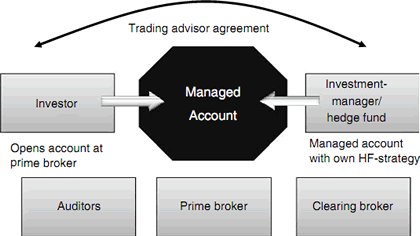 |
| Managed Account |
Managed or discretionary accounts are usually handled by professional brokers who trade independently but with the authority of the account holder. Managed accounts often occur in the context of the transparency persoalan of hedge funds.
They are considered an alternative to a classical hedge fund construction, because they do not have hedge funds’ problems of illiquidity (due to long lock-up periods), regulation, and, especially, lack of transparency.
In the context of hedge funds, managed accounts are based on trading advisor agreements. An investor opens an account at a prime broker (usually chosen by the hedge fund manager), which is then managed in trust by a hedge fund manager.
  |
Managed accounts were initially developed for (ultra) high-net worth individuals. The category has since expanded to include separately managed and multistrategy accounts, which can include up to 100 hedge funds also for less liquid investors.
Because the managed account itself is owned by the investor, he/she has control over operational due diligence. The investor obtains further benefits from high levels of customization. In other words, the investment guidelines of the account, such as the level of leverage and the combination of asset classes, are agreed upon individually.
 |
| Managed Account |
Other arguments for using managed accounts include return management items such as daily performance supervision, regular benchmarking, dynamic tactical allocation changes, as well as choice of hedge fund manager and cost-effective cash management. Structural advantages include high liquidity and daily reporting.
However, the most important advantages of managed accounts are in the context of risk management. The position and trading transparency of managed accounts allow for high levels of analyzing and reporting standards. Furthermore, the risk of fraud is greatly minimized, and “style drifts,” or “trading errors,” are recognized much more quickly.
The tax transparency and efi ciency are also higher compared to a classical fund structure. Theoretically, 99% of all hedge fund transactions could be reconstructed as managed accounts. However, there are mixed opinions over whether and how this would affect return levels.
There are, of course, some arguments against using managed accounts. For example, hedge fund managers fear that confidential information on their trading strategies may be more likely to get leaked to the market.
This could cause a loss of competitive advantage, or an increased risk that other market participants will trade against the hedge fund manager. Those arguments, however, are more applicable to prime brokers, who have signed confidentiality agreements.
One important argument against using managed accounts is that the best managers may not share insight into their positions and trading strategies, which could result in missed investment opportunities and returns. However, thus far, there is no empirical evidence of a connection between return and position transparency, given the necessary operational infrastructure.